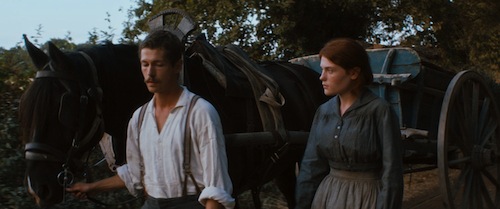Directed by Xavier Beauvois
Country: France / Switzerland
The wartime rural story illustrated in the French drama film “The Guardians” is painted beautifully with suave brushstrokes and surrounded by a bucolic aura whose contemplative attributes don’t interfere with the controversial emotions expressed by the characters.
The film was co-written and directed by Xavier Beauvois, a recurrent presence in Cannes, where he won the jury prize in 1985 with “Don't Forget You're Going to Die” and the Grand Prix and prize of the ecumenical jury in 2010 with “Of Gods and Men”, a memorable reflection about faith and terrorism.
In 1916, the 20-year-old Francine Riant (magnificent newcomer Iris Bry), an honest and hardworking orphan, joins the Paridier farm for the harvest season to help Hortense (established actress Nathalie Baye), the unsmiling matriarch of the Sandrail family. Since Hortense’s sons, Constant (Nicolas Giraud) and Georges (Cyril Descours), and son-in-law Clovis (Olivier Rabourdin) went to the frontline to fight the German invaders, the responsibility for the farm practically fell in the hands of women. Hortense’s husband is too old and tired to undertake any type of heavy work, while their daughter, Solange (Laura Smet), deals with too many tasks both inside and outside the home. Thus, the family sees the healthy Francine as a true savior and she becomes Georges’ sweetheart during the course of his regular visits. This defrauds the intentions of the young Marguerite (Mathilde Viseux-Ely), Clovis’ daughter from his first marriage. Georges is very fond of her, but for him, she's like a younger sister.
Frolicsome American soldiers are stationed in the village while waiting for orders to join the front. Their presence shakes the peace that reigns in the family, affecting Francine, who is obliged to move out of the farm carrying Georges’ son in her womb.
“The Guardians” is an icy tale of injustice, war, love, despair, and adaptability, which unfolds serenely yet assuredly with attentive period detail. Regardless the relative predictability of the events, Beauvois doesn’t trouble us with irrelevant tears or screams of anguish. He rather stimulates the intellect through the sensational imagery - impeccably photographed by Caroline Champetier - and patient storytelling, engendering a glorious finale with music and a radiant smile of love and hope to counterbalance the fissures of a fragmented heart.
Enduring pain as mothers, wives, or lovers, the women are the true heroes and villains of a quietly emotional film that comes fortified with engrossing performances, an appropriately moving score by the one-and-only Michel Legrand, and a refined editing by Marie-Julie Maille, a regular collaborator who also co-wrote.



